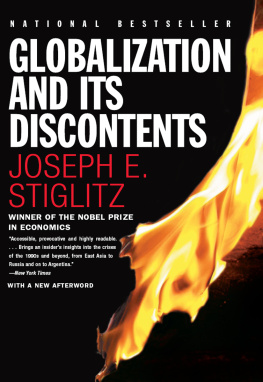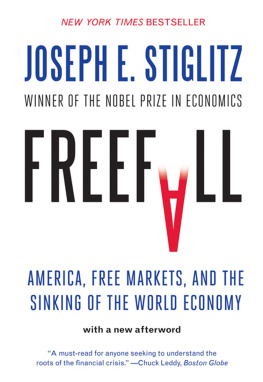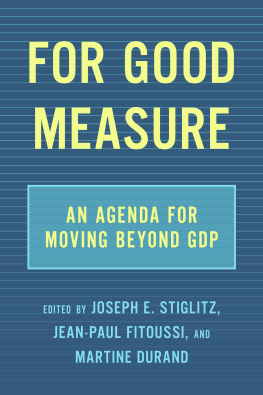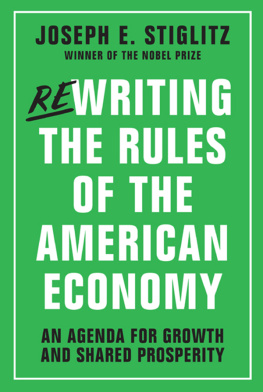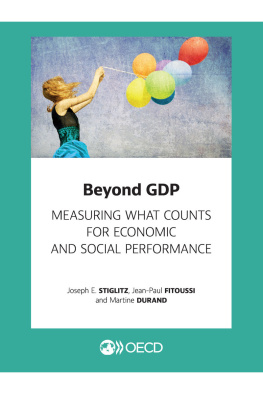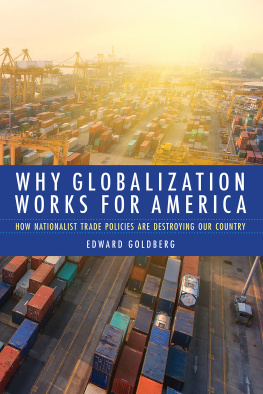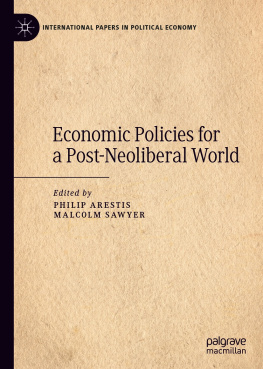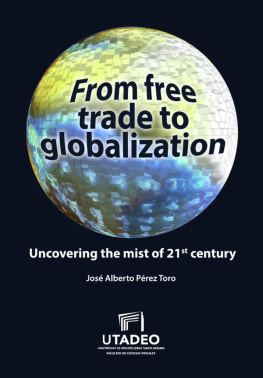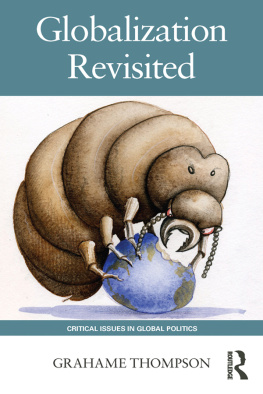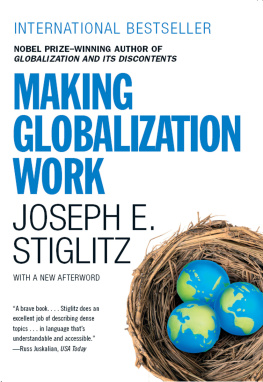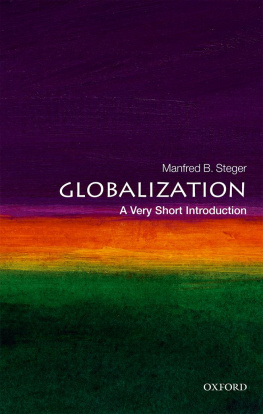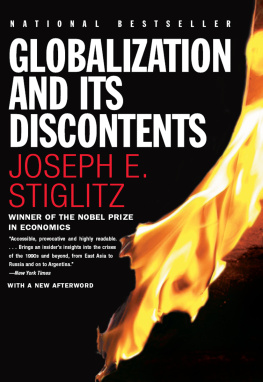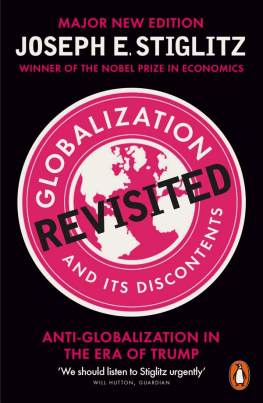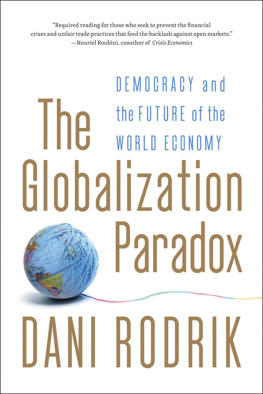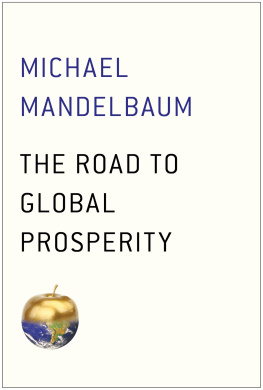More Praise for
MAKING GLOBALIZATION WORK
Filled with brilliant analyses of a wide range of issuesStiglitzs principal ambition is to offer not just critique, but a very concrete reform agenda.
Times Literary Supplement
[Stiglitz] briskly sorts out an assortment of issuesgrowth and poverty reduction, climate change, patent regimes, developing-country debtwith the air of a grandmaster dispatching 20 hapless opponents in a game of simultaneous chess.
Alan Beattie, Financial Times
A worthy counterpoint to Thomas Friedmans popular The World Is Flat .
Brendan Driscoll, Booklist
A searing critique of the conventional wisdom. Stiglitzs analysis is eye-openingbecause it is consistent and comprehensive, and he writes with rare clarity and passion for a distinguished economist.
Jeffrey E. Garten, Newsweek International
Presented with powerful, often emotional, arguments[Stiglitzs] head may be in his profession, but his heart is with the idealist and the hoodlums who disrupt high-toned conferences.
Joseph Lasos, St. Louis Post-Dispatch
At once a damning denunciation of things as they are, and a platform for how we can do better.
Andrew Leonard, Salon
Joseph Stiglitz is that rare breed: an economist who isnt afraid to declare that free trade must also be fair trade.
Jim Patterson, Foreign Service Journal
Some of these may seem like impossibly radical ideas now, butbooks like Making Globalization Work are where such ideas get their first popular airing.
Bruce Ramsay, Seattle Times
A brave book. Stiglitz is able to cut through the jargon and explain the complex in simple terms.
Russ Juskalian, USA Today
A well-written and informative primer on the major global economic problems. [Stiglitz] helps his readers understand exactly what is at stake.
Jeffry Frieden, New York Times Book Review
The establishment figure who turned on the establishmentan unlikely champion of the dispossessed.
Edie G. Lush, Spectator
Making Globalization Work offers a broad critical look at the world economy andproposes concrete policy goals and reforms. With a clarity the lay reader will appreciate, [Stiglitz] demonstrates that free trade doctrine does not have to be an intoxicant that legitimates domination; it can also be a set of civilized practices that promote equity as well as efficiency.
John Hoberman, Austin American-Statesman
The poster-boy of the anti-poverty movementrefreshingly readable.
Daily Telegraph
As a counterpoint to the market mantra, its a worthy agenda.
Steven Pearlstein, Washington Post
Passionate, engaging. He speaks from the heart as well as the head.
Independent
You dont have to agree with Stiglitz on every point to benefit from his creative thinking.
Peter Coy, BusinessWeek
The man with a mission to save the pooroffers a wealth of ideas for global reform.
The Times
Succeeds admirably at presenting a concrete course of action for strengthening the institutions and processes of political globalization.
Cynthia Cameros, Library Journal
His recommendations, delivered with simple elegance, should be widely accepted. It is rare for a book to contain such pressingly important ideas.
Sunday Herald
An excellent, very readable account of the shortcomings of globalizationa cry for fairness.
Observer
The thinker to put globalization to rights.
Scotsman
A thoughtful essay that sets out to provoke discussion in certain well-appointed offices, to say nothing of development and aid circles.
Kirkus Reviews
Every political movement needs intellectual leaders who help articulate its philosophy: Sitglitz has emerged as a major figure for both the developing and the developed worlds who are profoundly critical of the present character of globalization.
Martin Jacques, Guardian
ALSO BY JOSEPH E. STIGLITZ
The Roaring Nineties
Globalization and Its Discontents
MAKING GLOBALIZATION WORK
JOSEPH E. STIGLITZ

W. W. NORTON & COMPANY
NEW YORK LONDON
For Anya, forever
Copyright 2007, 2006 by Joseph E. Stiglitz
All rights reserved
For information about permission to reproduce selections from this book, write to Permissions, W. W. Norton & Company, Inc., 500 Fifth Avenue, New York, NY 10110
Library of Congress Cataloging-in-Publication Data
Stiglitz, Joseph E.
Making globalization work / Joseph E. Stiglitz.1st ed.
p. cm.
Includes bibliographical references.
ISBN: 978-0-393-06620-3
1. GlobalizationEconomic aspects. I. Title. HF1359.S753 2006 337dc22 2006020633
W. W. Norton & Company, Inc., 500 Fifth Avenue, New York, N.Y. 10110
www.wwnorton.com
W. W. Norton & Company Ltd., Castle House, 75/76 Wells Street, London W1T 3QT
CONTENTS
PREFACE
M y book Globalization and Its Discontents was written just after I left the World Bank, where I served as senior vice president and chief economist from 1997 to 2000. That book chronicled much of what I had seen during the time I was at the Bank and in the White House, where I served from 1993 to 1997 as a member and then chairman of the Council of Economic Advisers under President William Jefferson Clinton. Those were tumultuous years; the 199798 East Asian financial crisis pushed some of the most successful of the developing countries into unprecedented recessions and depressions. In the former Soviet Union, the transition from communism to the market, which was supposed to bring new prosperity, instead brought a drop in income and living standards by as much as 70 percent. The world, in the best of circumstances, marked by intense competition, uncertainty, and instability, is not an easy place, and the developing countries were not always doing the most they could to advance their own well-being. But I became convinced that the advanced industrial countries, through international organizations like the International Monetary Fund (IMF), the World Trade Organization (WTO), and the World Bank, were not only not doing all that they could to help these countries but were sometimes making their life more difficult. IMF programs had clearly worsened the East Asian crisis, and the shock therapy they had pushed in the former Soviet Union and its satellites played an important role in the failures of the transition.
I covered many of these topics in Globalization and Its Discontents . I felt I had a unique perspective to bring to the debate, having seen policies being formulated from inside the White House, and from inside the World Bank, where we worked alongside developing countries to help develop strategies to enhance growth and reduce poverty. Equally important, as an economic theorist, I spent almost forty years working to understand the strengths, and limitations, of the market economy. My research had not only cast doubt on the validity of general claims about market efficiency but also on some of the fundamental beliefs underlying globalization, such as the notion that free trade is necessarily welfare enhancing.
In my earlier book, I described some of the failures of the international financial system and its institutions, and showed why globalization has not benefited as many people as it could and should have. And I sketched out some of what needs to be done to make globalization workespecially for the poor and developing countries. The book included some proposals for reforming the world financial system and the international financial institutions that govern it, but space did not allow me to flesh out these proposals.
Just as my time in the White House and at the World Bank put me in a unique position to understand globalizations problems, so too has it provided me with the basis for this sequel. During my years in Washington, I traveled the world and met many government leaders and officials, as I studied the successes and failures of globalization. After I left Washington to return to academia, I remained involved in the globalization debate. In 2001, I received the Nobel Prize for my earlier theoretical work on the economics of information. Since then, I have visited dozens of developing countries, continued my discussions with academics and businesspeople, with prime ministers, presidents, and parliamentarians on every continent, and been involved in fora debating development and globalization involving every segment of our global society.


